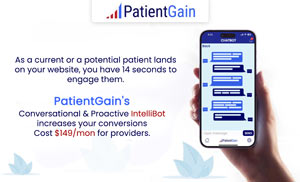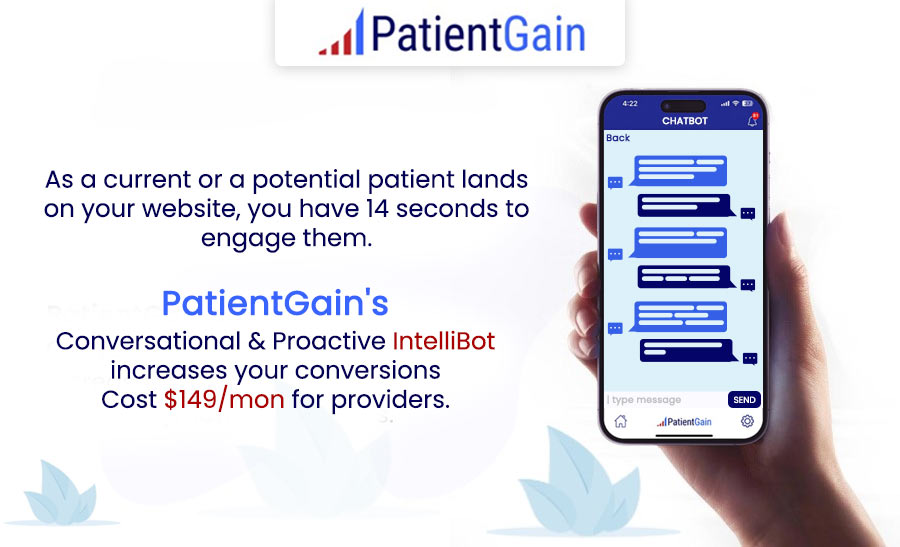HIPAA Compliant Chatbot For Medical & Dental Websites – $149/month
Common Question: Who Answers Medical Chabot Questions From Website? After installing and setting up HIPAA compliant ChatBot, “Who” is Responsible for Answering Questions From the Practice’s Website?
A medical chatbot is an excellent addition to any website and will make your medical practice much more efficient. It saves time for your staff by answering common questions so they can focus on more complex patient issues. One of the best aspects of a medical chatbot is that it does not go home at the end of the night or go on vacation. It is available every day and all day to assist your patients. However, a common question medical practices get asked by their patients is, “Who answers Chatbot questions on the website? when I a patient is chatting online with your website?” The chatbot is programmed to answer questions. However there are certain questions that require human interaction. These are sent to you as a SMS/Text or saved in a secure HIPAA Compliant CRM. PatientGain installs and setups the the HIPAA compliant medical chatbot for you. Since we have so many customers, we also know and have an inventory of hundreds of questions. These questions are programmed for you at no additional cost to you.


HIPAA Compliant Chatbot App Questions
Medical chatbot answers are provided by PatientGain, in addition, each clinic can add more questions or modify existing questions
A chatbot is not a live chat with a person or a secret supercomputer to chat with your patient. While it is designed to mimic a conversation of a real person, anyone who asks a chatbot a question receives answers from its software. No one at your medical practice or PatientGain.com is sitting by a computer waiting for questions to answer. It matches a question with a possible answer in its database, using artificial algorithms coupled with search algorithms. The questions it can answer, and the information to answer them are provided by PatientGain from its extensive database of questions and answers, in addition the medical practice can add or modify questions. Then these are programmed in by our technicians, requiring no programming or coding skills on your end.
The chatbot, if provided with enough information, will answer the most common questions with ease. For any question it does not understand, or if it is a question not listed on its database, it will then forward that question to your staff. The chatbot will record the question as well as the name, phone number, and email of the patient so your practice can follow up with them as soon as possible. A chatbot can answer many common questions if we are provided with a list of questions and answers or links for the patient to follow. Send us the most common questions and answers, and we’ll do the rest!
What are the most common things patients want to know? What questions should I think about including in my medical chatbot?
1. Are you open?
One of the most common questions your staff answers on the phone is if they are open and when they close. We can program your chatbot to list the hours of operation of your medical clinic.
2. Are you open during the weekend?
This question is an example of how we can put in new questions as needed. If there is a local natural disaster that prevents you from having services for several days or weeks, you can program your chatbot to answer appropriately.
2. Do you accept insurance at your clinic?
This common question is generally followed up by a question of if a medical practice accepts a specific insurance company. Provide us with an updated list of carriers, and we can list them for a curious patient.
3. Do you accept self-pay patients?
Not all clinics accept self-pay, but if you do, we can list out what the general costs are for a self-pay visit.
4. What is the address of the practice?
We can provide the address and a map link to a practice that patients can use to find your location. Often, we’ll include a map link that will direct their phone to open a mapping app, like Google Maps.
5. Where is it located?
Sometimes, patients want to know more about an area and what your medical practice is near or in. So if you have your business in a medical park, a mall, or a strip mall, this would be an excellent question to describe where you are located in.
6. Do you have a location close to me?
If your business has multiple locations, this is a chance to list out your facilities so a patient can determine which one is the closest. For those will a nationwide reach, a link to a map where they can type in their zip code may be more efficient.
7. Do you accept appointments?
For urgent care centers or other walk-in clinics, this might be important to tell patients what the status of appointments are at that location. Some urgent care centers will take appointments, while others will not.
8. How can I pay my bill online?
If a patient can pay their bill online, this question can return a link. If they can only pay over the phone, then a phone number will be provided or an address to send payment to. This is also an excellent time to list the form of payments your practice will take.
9. How do I request a prescription refill?
Some medical practices can provide a direct phone line to the person who handles prescription refills. If not, then a phone number with instructions on what information to have ready can be provided. Often, to facilitate the process, a patient should have their medication pill bottle with them to confirm the prescription refill.
10. How do I provide feedback to your staff about my visit?
Some medical practices may direct patients to leave feedback internally with the chatbot, or direct them to a review site like Google to leave a review.
11. How can I sign up for your email alerts?
Your website often has a location where patients can sign up for newsletters and other alerts. Our chatbot can provide a link to them to sign up.
12. I need patient registration forms, where do I go?
Here, the chatbot can provide patients a direct link to either your online patient registration system or the right forms to download, print out, and fill in. The chatbot can then provide additional instructions on how to submit the patient registration forms.
13. Can you treat me for this illness or injury?
For general questions, we can provide the patient with a list of illnesses and injuries your medical practice treats. We can also have it provide direct answers to direct questions like, “Can you treat me for the flu?”
14. Do you provide this service?
As mentioned above, we can develop questions and answers for every single service you provide.
15. Can I make an appointment for next week?
If you have an online appointment system, the chatbot will provide a link for them to make an appointment. If appointments are created internally, it will collect all of the information it needs and forward it to your staff for follow up.
16. Could someone from your medical practice call me?
Sometimes a patient may want to speak with someone to see if they should come in and be seen by a doctor. Sometimes, this occurs in the middle of the night. By taking a message with a chatbot, it can forward it to the staff to be followed up on the next morning. This often works better than someone listening to a voice mail, trying to figure out what someone needs and how to contact them.
17. Do you have special hours coming up for this holiday?
Your hours may differ for specific holidays or times of the year. We can program and update hours to particular holidays.
18. Where can I park at your medical practice?
This often is a frequent question for those who have never visited your clinic before. To avoid late arrivals, this is a good time to advise them what times of the day they should give themselves more time to travel.
19. Do any buses or subways have stops nearby?
For those in a more urban or suburban setting, this is excellent information for those taking public transit. It will help them figure out how to get to your clinic and save your staff time by providing directions.
20. What are my lab results?
If your clinic provides lab testing, this is a common question. However, HIPAA regulations do not allow a chatbot to give results back in this format. You can program a chatbot to list the average times it takes for lab results to be returned. This saves your staff time from answering questions of how long a patient has to wait to get their results back. This would also be an excellent time to let them know of any circumstances (the weekend or holidays) where it may take longer.
The questions above should not be interrupted as the ONLY questions a chatbot can answer, but rather some of the most common. We can program 20 or 200 questions, depending on the needs of your medical facility. Call our experts today at PatientGain.com, and we can help you design an excellent chatbot for your website!
